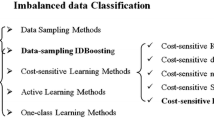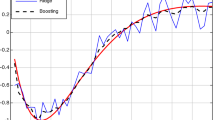Abstract
Boosting algorithms are a class of general methods used to improve the general performance of regression analysis. The main idea is to maintain a distribution over the train set. In order to use the given distribution directly, a modified PLS algorithm is proposed and used as the base learner to deal with the nonlinear multivariate regression problems. Experiments on gasoline octane number prediction demonstrate that boosting the modified PLS algorithm has better general performance over the PLS algorithm.
Similar content being viewed by others
References
Y. Freund, R. E. Schapire, A decision-theoretic generalization of online learning and an application to boosting[J]. J. of Computer and System Sciences, 1997, 55(1): 119–139.
Y. Freund, An adaptive version of the boost by majority algorithm[J]. Machine Learning, 2001, 43(3): 293–318.
J. H. Friedman, T. Hastie, R. Tibshirani, Additive logistic regression: a statistical view of boosting[J]. Annals of Statistics, 2000, 28(2): 337–374.
R. E. Schapire, Y. Singer, Improved boosting algorithms using confidence-rated predictions[J]. Machine Learning, 1999, 37(3): 297–336.
H. Drucker, Improving regressors using boosting techniques[C] // Proc. of the 14th International Conference on Machine Learning. San Francisco: Morgan Kaufmann Publishers, 1997: 107–115.
H. Drucker, Boosting using neural nets[M] // Combining Artificial Neural Nets: Ensemble and Modular Multi-Net Systems. London: Springer, 1999: 51–77.
G. Ridgeway, The state of boosting[C] // Proc. of the 31st Symposium on the Interface: Models, Predictions, and Computing. Schaumburg, Illinois: Elsevier, 1999, 31: 172–181.
G. Ridgeway, D. Madigan, T. Richardson, Boosting methodology for regression problems[C] // Proc. of the Seventh International Workshop on Artificial Intelligence and Statistics. San Francisco, CA: Morgan Kaufmann Publishers, 1999: 152–161.
P. Geladi, B. R. Kowalski, Partial least-squares regression: a tutorial[J]. Analytica Chimica Acta, 1986, 185(1): 1–17.
V. N. Vapnik, Statistical Learning Theory[M]. New York: John Wiley & Sons, Inc, 1998.
L. G. Valiant, A theory of the learnable[J]. Communications of the ACM, 1984, 27(11): 1134–1142.
R. E. Schapire, The strength of weak learnability[J]. Machine Learning, 1990, 5(2): 197–227.
R. E. Schapire, The boosting approach to machine learning: An overview[C] // Lectures Notes in Statistics: Nonlinear Estimation and Classification, Proc. from MSRI Workshop. Berlin: Springer-Verlag, 2001: 149–172.
J. J. Kelly, C. H. Barlow, T. M. Jinguji, et al. Prediction of gasoline octane numbers from near-infrared spectral features in the range 660-1215nm[J]. Analytical Chemistry, 1989, 61(4): 313–320.
Author information
Authors and Affiliations
Additional information
This work was supported by the National High-tech Research and Development Program of China (No. 2003AA412110).
Ling YU was born in 1974. She received the M.S. degree in control theory and application from Zhejiang University in 1998, and now is an on-job doctoral candidate of Zhejiang University. Her current research interests are in the area of nonlinear identification and multivariate regression analysis.
Tiejun WU was born in 1950. He received the Ph. D. degree in engineering from Zhejiang University in 1988. He is currently with Zhejiang university as professor. His research interest is focused on complex systems intelligent control and optimization.
Rights and permissions
About this article
Cite this article
Yu, L., Wu, T. Boosting the partial least square algorithm for regression modelling. J. Control Theory Appl. 4, 257–260 (2006). https://doi.org/10.1007/s11768-006-5231-z
Received:
Revised:
Issue Date:
DOI: https://doi.org/10.1007/s11768-006-5231-z




